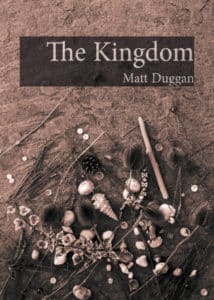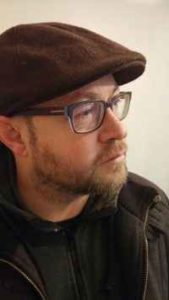Memory, and memories, can become tangled in the reality of current experience. The backyards or gardens of the homes we grew up in somehow shrink over the years. Beloved teachers age and retire. Images and scenes from vacations or holidays rarely remain how we remember them. Even books and poems seem to change over time, becoming sometimes less and sometimes more impactful and profound than upon first reading.
A high school English teacher once told my class that you needed to read Don Quixote by Miguel de Cervantes three times — once in youth, once in middle age, and once in old age, because, she said, the book would change. I’ve read it twice — in youth and middle age — and discovered she was absolutely correct. Reading it at 40 was not the same as reading it at 17.
Poet Matt Duggan is no stranger to how memory gets tangled. His latest chapbook, The Kingdom, is about, among other things, returning to what’s past, leaving you wondering if the past never really was. Too often it’s not what we remember it to be. And we feel a loss.
Duggan considers his 49th birthday, and he hears the sound of birds in flight. He scrolls through Facebook profiles, examining the photos of moments frozen in time, perhaps serving as a “digital obituary.” He looks at myths, and wonders whether they represent true stories or only our understanding of a brief moment. Even walking down the street, he senses ghosts watching like “well-behaved tourists.”
He even plays with the idea of eye plates, which I’ve always assumed were those hooks bolted on boats for tying up at the dock. Duggan uses a related but different definition — eye plates are glasses that allow us to see, however imperfectly, and anchor us to what we believe is the familiar and the known. And there are some things these eye plates won’t allow us to see.
Vision

we see clearly the crooked roots when older;
never see the blue oceans and sky in blood orange;
turning a second eye for what should never
be we’ll help the lungs of earth begin to falter
–eye plates diluted for a world we couldn’t
see;
If our children are beaten and bleed we
shall help with the flow of a blood culture;
never see blue oceans and sky in blood orange;
Our planet a smog of beauty and black
streams though our sight could never be
altered, eye plates diluted for a world we
couldn’t see.
Designed our living quarters with plastic
trees we gazed from neon into high
voltage; never see blue oceans and sky in
blood orange.
Built division into our mapped psyche
placed us like experiments in storage—
eye plates dilated for a world we couldn’t
see; never see blue oceans and sky in blood
orange.

Matt Duggan
Duggan was born in Bristol, England, in 1971 and lives there today. His poems have appeared in numerous online and print journals, including Indiana Voice Journal and Ink Sweat and Tears. He started and still hosts a spoken word evening at the Hydra Bookshop in Bristol. His Dystopia 38.10 won the 2015 Erbacce prize for poetry.
You read a chapbook like The Kingdom, and you feel unsettled. And then you understand that the places we have been, the people and events we remember so well, are never really in the past. Even as they change, or our understanding of them changes, they remain an integral part of the present.
Related:
Matthew Duggan’s “Underworld: The Modern Orpheus”
Poets and Poems: Matt Duggan and “Dystopia 38.10”
Poets and Poems: Matt Duggan and “One Million Tiny Cuts”
Poets and Poems: Matt Duggan and “A Season in Another World”
Poets and Poems: Matt Duggan and “Woodworm”
- Longfellow’s “Paul Revere’s Ride”: Creating a National Legend - April 17, 2025
- Poets and Poems: Katie Kalisz and “Flu Season” - April 15, 2025
- Poets and Poems: Michelle Ortega and “When You Ask Me, Why Paris?” - April 10, 2025

Leave a Reply